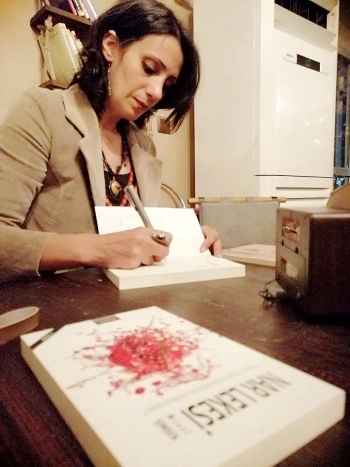Türkçe Nupel | Français | English
To all the nameless ones who lost their life on the borders…
That year, winter had lasted longer and even before spring came, summer had arrived.
As soon as she half-opened the curtains she winced from the rays of sunlight, as if subjected to sudden light after a long time spent in the dark. Once the dazzling effect dissolved, she looked outside. Even if the branches of the chalef 1 extending in front of the window kept her from seeing the street, they brought the bird songs closer, giving the impression that all the birds in the neighbourhood were interpreting a concert in the living room. She opened the window so that this song would invade the interior completely. Apart from the bird calls, the rustlings from the trees and a few passing cars, the street was relatively quiet. For a brief moment, she thought that she would miss this street she did not like. And this made her sad.
In the kitchen, she realised the water she had set to heating for coffee had been boiling for a good while already. She prepared her coffee and moved to the table. There was little time left, and she wasn’t done with preparing everything yet. She had to make up her mind. Either she would stay and give up on everything just for her, or she could leave and continue the struggle to make the world more beautiful. She had to leave. She was determined. Today, she must absolutely get her things ready. In any event, she could only bring very few things with her and she had to choose them as quickly as possible. Everything left behind could be sent on to her in several months time. At the last sip of her coffee, she became aware that she had been sitting there for dozens of minutes. Because the coffee had grown cold. She got up slowly, went to her wardrobe. She opened her suitcase that had been waiting for several days in a corner of the room, and put it on the bed.
While changing the things she was setting in the suitcase a number of times, she tried to remain as quiet as possible. The children were still sleeping and she did not want them to witness these preparations. Taking off on this long uncertain journey without them weighed down on her once again. She collapsed on the bed.While she cried with one hand covering her mouth, the pain in her chest grew with every passing second. Her eyes caught her reflection in the mirror facing the bed. She was startled as if she had seen herself on a ghost train, and stood up suddenly. She moved closer to the mirror and was surprised to discover the white strands constellating her light brown hair, that only a few weeks ago, were like tree pollen. At the same time, she attempted to dry her tears, to recover a normal breathing pattern, despite the sobs. Removing the clip in her hair, she ran her hand through it. A fistful of hair stayed in it. At that moment, a voice resonated behind her. She froze.
“So there won’t be any more hairs falling in the house ? I won’t holler anymore finding your hair on my pillow?”
She remained paralysed for a moment, not knowing what to answer to this question. And setting a sad and artificial smile on her face:
“You won’t be able to complain over my losing my hair, think about it from this angle. And the smell of cigarette caught in my hair will no longer find its way onto your pillow. That’s a good thing,” she said in clipped words that grabbed her by the gut.
The child said “I would have liked your hair to fall on my life, mummy” and immediately jumped at the women’s neck and started to sob heavy tears.
The birdsong from the street had turned into a cry in which children’s voices mixed in, penetrating the women’s heart. The child was hugging her so hard that only a wish to return to the times when it was inside the mother’s body could explain such an embrace. Other than this wish to be in the times when the fear of loss did not exist, there was no justification for this embrace that hurt.
The child cried, hiccups from the tears filled the woman’s hair. The woman said not a word. Anything that could be said would be powerless before the child’s tears. She knew it. She simply caressed the child’s hairs, fearing to cause more pain. The minutes marked by the child’s tear went by. He moved back a few steps and seeing the pain on his mother’s face, he attempted to dry his face with his hands and to speak at the same time:
“I’m sorry mummy, I let myself go for a minute. I know you must leave and that this separation will be temporary. Please don’t be sad.”
With these words from the child, the pain the woman felt even greater. The one needing forgiveness wasn’t the heart in front over, beating the way a bird’s wings does, but her own. Knowing this only burned even more. She was dismayed.
Another weepy voice filled the room then, as she said “my child, don’t ever ask for forgiveness again. I’m the one asking you, for making you live through this. Yes, it will be hard for all of us, but I promise you, it won’t be for long. You’ll be able to scold again for the smell of cigarettes on your pillow. My hair will fall on your bed, I promise you.”
“Why are you asking for forgiveness, mummy? You haven’t done anything requiring forgiveness! Yes, you are leaving, you must leave, but soon, we will be with you. Please don’t be sad, we will be strong.”
The child finished speaking and moved toward her mother and her brother. All three embraced. The birds were still crying. The flowered dress, on the top of the suitcase looked at them sadly, the hair in the woman’s hand quivered under their three combined breaths…
The friendship I have developed with an empty suitcase is perhaps the wish to leave behind those wounded times filled with those who do not see the cry from the earth crushed under their feet, the sadness of the stones in the sidewalks, the mourning of daisies, the harsh blueness of the sky, the song of the mountains, the tears of the rivers. I tell myself that suitcases define the road, depending on what we put into them. Yet, the road was what mattered, revealing its colours, along with the suitcases…
TO READ ALSO
On Kedistan: Meral Şimşek • Between two borders
On Bianet: Kurdish writer Meral Şimşek tortured with strip search by police in Greece



